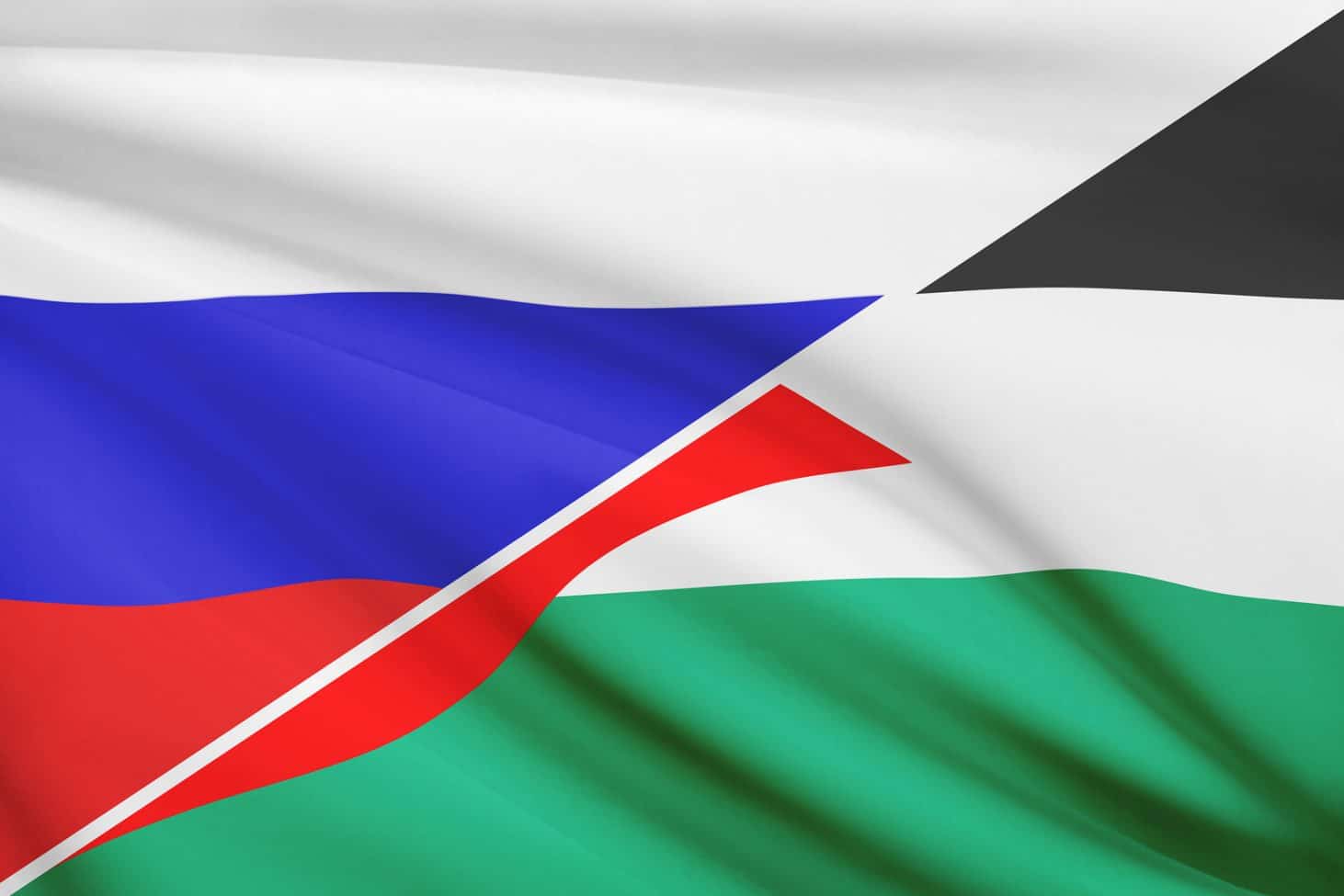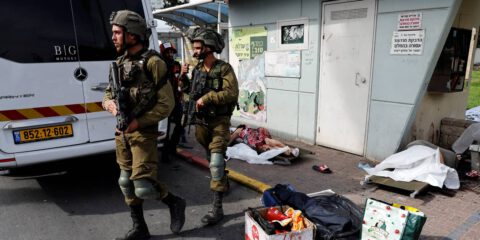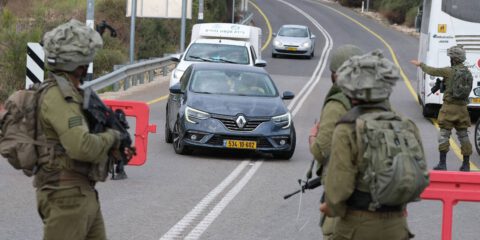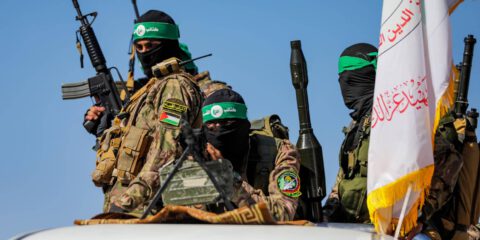Russia seeks to be more involved in the Israeli-Palestinian conflict by presenting it as critical to the stability of the whole Middle East. But the legitimacy that it accords to Hamas rules out deeper Russian involvement from Israel’s point of view.
Russia has recently stepped-up its involvement in internal Palestinian affairs, specifically in attempts to broker reconciliation between Hamas and Fatah. Russia is also seeking a role in final status negotiations between the Palestinians and Israel, out of a desire to break the American monopoly on regional peace diplomacy.
Two years ago, Russia hosted meetings meant to achieve internal Palestinian unity, but these failed. Now, Russia is again striving to position itself as a Hamas-Fatah mediator and as the exclusive mediator of regional conflicts.
Russia’s Support of Hamas
In December 2018, Russia invited Ismail Haniyeh to Moscow for an official visit. This invitation was a continuation of a Russian policy that’s been in place since Hamas took power in 2006. Haniya’s predecessor, Khaled Mashaal, also visited Moscow frequently.
Unlike the United States and European Union, Russia doesn’t regard Hamas as a terrorist organization. Russia’s stance is that Hamas rule in Gaza is legitimate since the organization was democratically elected.
Russia’s Hamas policy stands in complete opposition to Western policy in general, and to Israeli policy in particular. Just several weeks ago, Russia voted against a US proposal in the UN to condemn Hamas terrorist activities. Moscow then went a step further by actively seeking to again broker talks between Hamas and the Palestinian Authority.
Russia’s Zero-Sum Rationale
Russia’s stance regarding Hamas is based on a general approach of bolstering anti-Western movements, especially those that are anti-American. This approach dates back decades, to when Russia supported the US opposition in Vietnam and Afghanistan.
This policy reflects Russia’s “zero-sum game” concept. In this construct, wherever the US is present, Russia is by default excluded. Wherever Russia can increase its influence, US influence must by definition be reduced. Indeed, Russia is making headway in regions and countries where the US is in the process of shrinking its involvement.
Specifically, Libya and Syria come to mind. Russia’s increased involvement in Syria drives home the point that Moscow is a reliable ally that has helped Syrian President Bashar al-Assad stay in power. In contrast, the US appears as an unreliable partner whose support seems to blow hot and cold based on new developments. Another reason for Russia’s support for Hamas is Moscow’s long-standing desire to take a leading role in resolving the Israeli-Palestinian conflict. As an interim measure, Russia is working to promote intra-Palestinian reconciliation among the various factions.
From the Palestinian perspective, Russia’s ability to negotiate with all the rival parties places it in a unique international position. A senior Hamas figure was quoted as saying that Russia has played a central role in the process, since it is in contact with all sides.
At the same time, Russia works to maintain a strong relationship with Israel. When Washington declared its intention to relocate the US Embassy to Jerusalem, Moscow stated that it recognized West Jerusalem as the capital of Israel. This Russian declaration was made without stipulations on Israel needing to make good faith efforts towards the Palestinians.
This gesture of Russia’s towards Israel isn’t surprising. Russia feels no moral obligation to Fatah or Hamas. For the Kremlin, one of the most significant threats is Islamic radicalization, especially of the Sunni variety, that could spill into Russia.
This concern, along with regional and global ambitions, are fueling Russia’s involvement in the Israeli-Palestinian conflict. Moscow views its roles in intra-Palestinian and Israeli-Palestinian affairs as important to strengthening its position in the Arab and Muslim worlds. Indeed, Russia seeks to strengthen relations not only with administrations across the Middle East but the Arab street as well, and polls conducted in Mideast countries indicate increasing support for reliance on Russia. In contrast, support for US regional involvement is on the decline.
Moreover, Western countries are turning to Moscow for assistance in reaching settlements in the Middle East. After US President Donald Trump declared that Washington was withdrawing from the nuclear agreement with Iran, French President Emmanuel Macron and German Chancellor Angela Merkel met with Russian President Vladimir Putin to persuade him to “calm” the Iranians and maintain regional stability.
At the Istanbul summit of October 2018 on Syria, France and Germany recognized Russia’s vital role in ending the fighting in a country devastated by years of war. In short, Russia is once again viewed as an influential player in the Middle East. For the same reasons, Russia is working with Fatah and the Palestinian Authority to reconcile with Hamas. Ultimately, Moscow seeks to use Palestinian internal reconciliation as a springboard for the renewal of Israeli-Palestinian negotiations. Indeed, PA Foreign Minister Riyad al-Maliki recently visited Moscow at the invitation of Russian Foreign Minister Sergey Lavrov to discuss bilateral relations and get the political process with Israel back on track.
Previously, in February 2018, Palestinian Authority President Mahmoud Abbas met with Putin in Moscow. Abbas declared that Russia was an important factor in the peace process. The rift between Washington and Ramallah, especially since the announcement of the transfer of the US embassy to Jerusalem, alongside the Trump administration anticipated peace plan (which the Palestinians already view as too pro-Israeli), are proving to be amenable platforms for rapprochement between the Palestinians and Russia.
Russia’s Opposition to Trump’s Deal of the Century
After meeting in June 2018 with Mousa Abu Marzouk, Deputy Chairman of the Hamas Political Bureau, Russian Deputy Foreign Minister Mikhail Bogdanov announced that Moscow would not relate to the anticipated Trump Administration peace plan – the so-called ‘deal of the century’ – but instead advance plans of its own. Bogdanov also stated that Russia intended to facilitate an internal Palestinian reconciliation that would lead to a unified position in negotiations with Israel.
Abu Marzouk stated that Russia had explicitly promised to not allow the ‘deal of the century’ to move forward. Even though the PA is opposed to the strengthening of ties between rival Hamas and Moscow, both Palestinian factions share a similar position regarding the ‘deal of the century’.
As such, Russia’s rejection of the deal of the century serves the interests of both the Palestinian Authority and Hamas. Russia is once again trying to focus the international community’s attention on the Israeli-Palestinian conflict, arguing that a solution to the conflict is crucial to the stability of the entire Middle East. This, despite the fact that ever since the ‘Arab Spring’ regional meltdown, it has become quite clear that the Israeli-Palestinian conflict is merely one source of instability in the region; and has nothing to do with the intra-Arab tragedies in Libya, Yemen, Syria and other countries in the region.
In May 2018, Russia accused the US of trying to divert the international community’s attention from the Israeli-Palestinian conflict, making it impossible to implement UN resolutions regarding establishment of a Palestinian state.
Russian Foreign Minister Lavrov even asserted that the Israeli-Palestinian conflict was one of the most significant factors in the successful recruitment of young people by extremist organizations. Of course, this assessment ignores processes that are completely removed from the Israel-Arab conflict, such as the historic hostility between Sunnis and Shiites and the rise of organizations such as ISIS.
Russia’s Entrenchment, Israel’s Interests Moving Forward
Given Russia’s entrenchment in the region, it is in Israel’s interests to reach understandings and a certain level of cooperation with Moscow. However, Israel is unlikely to soften its position regarding Russia’s involvement in Israeli-Palestinian affairs; meaning, that Israel sees Washington and not Moscow as the key global interlocutor in this arena.
Specifically, the legitimacy accorded to Hamas by the Kremlin could yet lead Israel to take symbolic yet unusual diplomatic steps against Russia. One recent example was Israel’s exceptional decision to support a US proposal condemning Russia for its actions in the Crimea.
The recent announcement of the cancellation of a planned visit by senior Hamas officials to Moscow may indicate that Russian policymakers are beginning to understand this. Close ties between Hamas and Russia only serve to lessen Moscow’s relevance as a peace negotiator – as far as Jerusalem is concerned.
JISS Policy Papers are published through the generosity of the Greg Rosshandler Family.
photo: Bigstock









 - בניית אתרים
- בניית אתרים